When it comes to kitchen countertop options, homeowners are faced with an overwhelming number of choices. Selecting the right countertop can have a huge impact on both the functionality and aesthetic appeal of your kitchen. There are various materials, finishes, and designs to consider, each offering unique benefits and drawbacks. The perfect kitchen countertop will depend on your lifestyle, design preferences, budget, and how much maintenance you’re willing to commit to over time. From classic natural stone like granite to innovative, eco-friendly surfaces like recycled glass, the options are diverse. Understanding the characteristics of each material can help you make an informed decision that will serve your needs for years to come.
Granite countertops remain one of the most popular choices for kitchens due to their natural beauty and durability. As a natural stone, granite comes in a wide variety of colors and patterns, ensuring that no two slabs are exactly alike. This uniqueness appeals to many homeowners who want to add a distinctive, luxurious touch to their kitchen. Granite is highly resistant to heat and scratches, making it an excellent choice for busy kitchens where cooking is frequent. However, granite is porous, which means it requires regular sealing to prevent staining and bacteria growth. Despite the maintenance requirement, granite is a long-lasting and beautiful option that can increase the value of your home.
Marble is another natural stone option that brings elegance and timeless beauty to the kitchen. Its sleek, cool surface makes it a favorite among bakers, as it’s ideal for rolling out dough. Marble’s soft veining patterns and luxurious appearance make it a showstopper in any kitchen design. However, marble is softer and more porous than granite, making it prone to scratching, etching, and staining. Acidic substances like lemon juice or vinegar can leave marks on the surface if not wiped up immediately. Because of these drawbacks, marble may not be the best choice for high-traffic kitchens, but it can still be a great option for those who are willing to put in the effort to maintain its appearance.
Quartz countertops are another highly popular choice and are praised for their durability, low maintenance, and wide range of styles. Quartz countertops are engineered from natural quartz crystals and resin, which creates a non-porous surface that resists stains, scratches, and bacteria growth. Unlike natural stone, quartz does not require sealing, making it a more convenient option for busy homeowners. Quartz countertops come in a wide array of colors and patterns, some of which mimic the look of natural stone like marble or granite. With its versatility and durability, quartz is a top contender for those who want a hassle-free yet stylish kitchen countertop.

For a more eco-friendly option, recycled countertops are gaining popularity among homeowners who want to incorporate sustainable materials into their kitchens. Recycled countertops are made from a combination of recycled glass, porcelain, and other materials, creating a unique and environmentally friendly surface. These countertops come in a variety of colors and textures, offering a distinctive look that stands out in any kitchen design. Not only do recycled countertops contribute to sustainability, but they are also durable and resistant to stains and heat. They may not be as widely available as other materials, but they are an excellent choice for the environmentally conscious homeowner.
Wood or butcher block countertops offer a warm, natural look that can complement a variety of kitchen styles, from rustic to modern. Wood countertops are typically made from hardwoods like maple, oak, or walnut, which are highly durable and can withstand the rigors of kitchen use. The warmth and texture of the wood add a cozy, inviting feel to the kitchen. However, wood countertops require regular maintenance to prevent damage from water and bacteria. They need to be sealed or oiled regularly and can be prone to scratches and dents. Despite these drawbacks, wood countertops remain a popular choice for those who appreciate their natural beauty and functionality.
Concrete countertops are another option that has grown in popularity in recent years. These countertops offer a unique, industrial look that can be customized in terms of color, texture, and finish. Concrete is highly durable and can be shaped to fit any kitchen design, making it a versatile choice. However, like natural stone, concrete is porous and requires sealing to prevent staining. It is also prone to cracking over time, though these cracks are often cosmetic and can be repaired. Concrete countertops can be tinted in various colors or even embedded with decorative elements like glass or stone for a truly one-of-a-kind look.
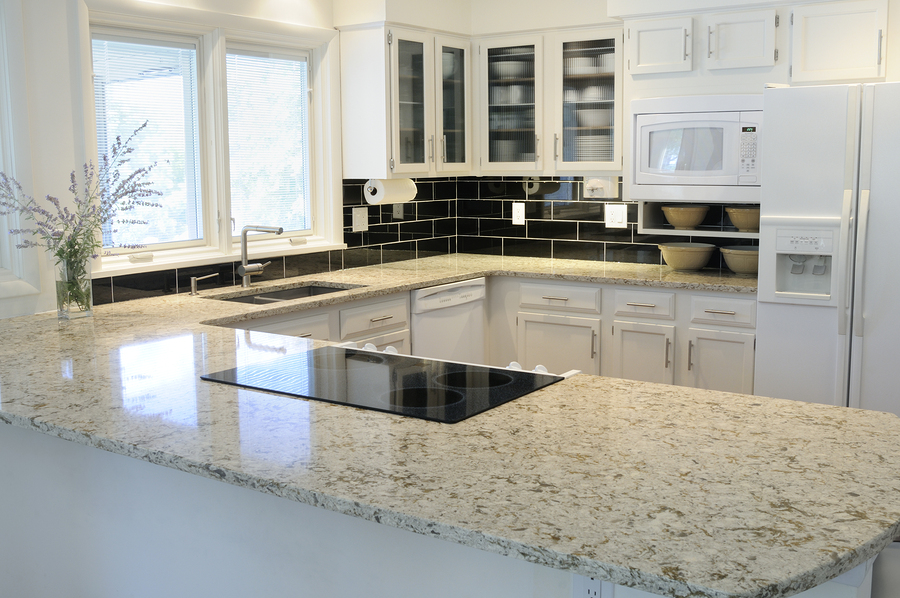
Solid surface countertops, like those made from Corian, are another option for homeowners who want a seamless, low-maintenance surface. Solid surface countertops are made from a blend of acrylic and resin, which creates a smooth, non-porous surface that is resistant to stains and bacteria. These countertops are easy to clean and can be repaired if scratched or damaged. Solid surface countertops come in a wide range of colors and patterns, allowing homeowners to customize their kitchen’s aesthetic. While they may not have the same natural beauty as granite or marble, they are a practical and cost-effective option for many homeowners.
Laminate countertops have long been a budget-friendly option for kitchens, offering a wide range of colors and patterns at an affordable price. Laminate countertops are made from a combination of plastic and particleboard, which creates a lightweight and versatile surface. While laminate has improved significantly in recent years in terms of appearance and durability, it is still more prone to scratching and heat damage than other materials. However, for those looking for an inexpensive and low-maintenance option, laminate countertops can be a great solution, especially in rental properties or budget-conscious homes.
Soapstone countertops are a lesser-known but highly durable option for kitchens. Soapstone is a natural stone that has a smooth, matte finish and is available in shades of gray or black. It is non-porous, meaning it resists stains and bacteria without the need for sealing. Soapstone is also highly heat-resistant, making it an excellent choice for avid cooks. While soapstone can develop a natural patina over time, many homeowners appreciate the aged look it acquires. It is softer than granite, so it can scratch or dent more easily, but these imperfections can often be sanded out.
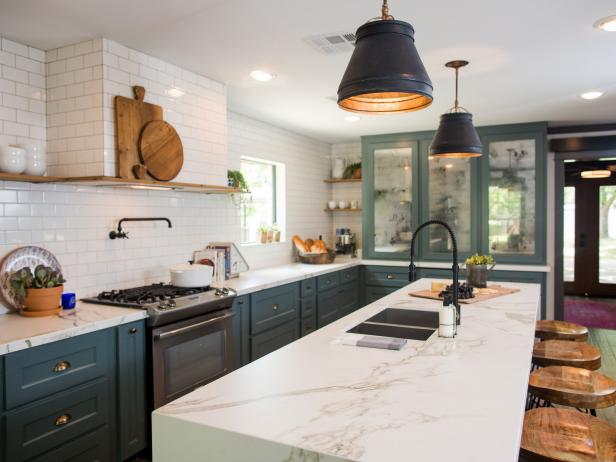
Stainless steel countertops are a popular choice in professional kitchens, but they are also making their way into residential homes. Stainless steel offers a sleek, modern look that pairs well with industrial or contemporary kitchen designs. It is highly durable, resistant to heat and bacteria, and easy to clean. However, stainless steel countertops can be prone to scratching and showing fingerprints, which may be a drawback for some homeowners. Despite these challenges, stainless steel is an excellent option for those who prioritize functionality and a modern aesthetic in their kitchen.
Tile countertops offer a unique and customizable option for kitchens. Ceramic or porcelain tiles can be arranged in various patterns and colors to create a distinctive look. Tile countertops are durable, heat-resistant, and easy to clean, making them a practical choice for busy kitchens. However, the grout lines between tiles can be prone to staining and require regular maintenance. Tile countertops are also more susceptible to chipping or cracking compared to solid surface materials. Despite these drawbacks, tile countertops remain a popular choice for those who want a customizable and affordable kitchen surface.
For homeowners who want a natural, earthy look in their kitchen, slate countertops offer a unique and durable option. Slate is a natural stone that is available in shades of gray, green, and black. It is non-porous, stain-resistant, and heat-resistant, making it a practical choice for kitchen countertops. Slate has a more rustic, textured appearance compared to other natural stones like granite or marble. While it is not as widely available as other countertop materials, slate is a great option for those looking for something different in their kitchen design.

If you’re looking for a countertop material that combines beauty and durability, engineered stone is another option worth considering. Engineered stone countertops are made from a combination of natural stone and resin, creating a durable, non-porous surface that is resistant to stains and scratches. These countertops are available in a variety of colors and patterns, many of which mimic the look of natural stone like marble or granite. Engineered stone offers the best of both worlds: the beauty of natural stone with the low-maintenance benefits of quartz.
Terrazzo countertops are making a comeback in modern kitchens, offering a unique and artistic option for homeowners who want to make a bold statement. Terrazzo is made from a mixture of marble, quartz, glass, and other materials embedded in concrete or resin. The result is a colorful, speckled surface that adds a playful yet sophisticated touch to the kitchen. Terrazzo countertops are highly durable and resistant to stains, though they can be prone to cracking if not properly installed. While they require professional installation, terrazzo countertops are a great way to add personality to your kitchen.
Finally, glass countertops offer a sleek, modern option for homeowners who want something out of the ordinary. Glass countertops are available in a variety of colors and finishes, from clear and frosted to textured or backlit options. Glass is non-porous, making it resistant to stains and bacteria, and it can handle high heat without damage. However, glass countertops can be prone to scratching and chipping, so they may not be the best choice for families with young children or busy kitchens. Despite these challenges, glass countertops offer a unique and contemporary aesthetic that can make a kitchen stand out.
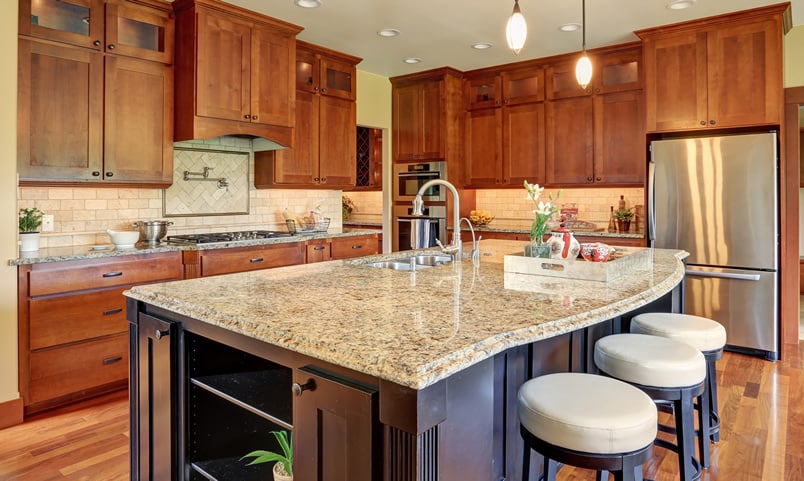
Common Mistakes to Avoid
One common mistake when selecting kitchen countertops is not considering the long-term maintenance requirements of each material. Some homeowners may be drawn to the beauty of materials like marble or granite but may not realize how much upkeep is required to keep them looking their best. Another mistake is choosing a material based solely on aesthetics without considering its durability or functionality. For example, while glass countertops may look stunning, they may not be the best option for a busy family kitchen. Additionally, improper installation can lead to issues like cracking or uneven surfaces, so it’s crucial to hire a professional installer for materials like stone or concrete.
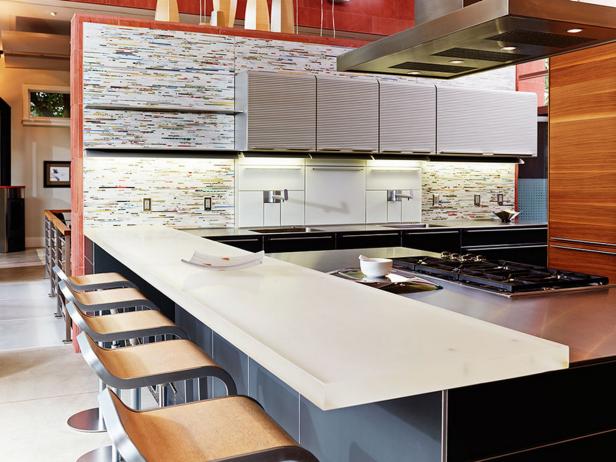
What is the most durable kitchen countertop material?
Quartz and granite are both highly durable countertop materials. Quartz is engineered to be scratch, stain, and heat resistant, while granite is a natural stone that is incredibly hard and resilient. Both materials offer long-lasting performance in busy kitchens.
Are natural stone countertops worth the maintenance?
Natural stone countertops like granite and marble offer unmatched beauty and uniqueness. However, they require regular maintenance, including sealing and careful cleaning, to prevent stains and damage. If you’re willing to put in the effort, natural stone can be a worthwhile investment that adds value to your home.
Can I use a cutting board directly on my countertop?
It’s recommended to use a cutting board on all countertops, even those made from durable materials like granite or quartz. Cutting directly on the surface can cause scratches or dull your knives over time, and using a cutting board helps protect both the countertop and your utensils.
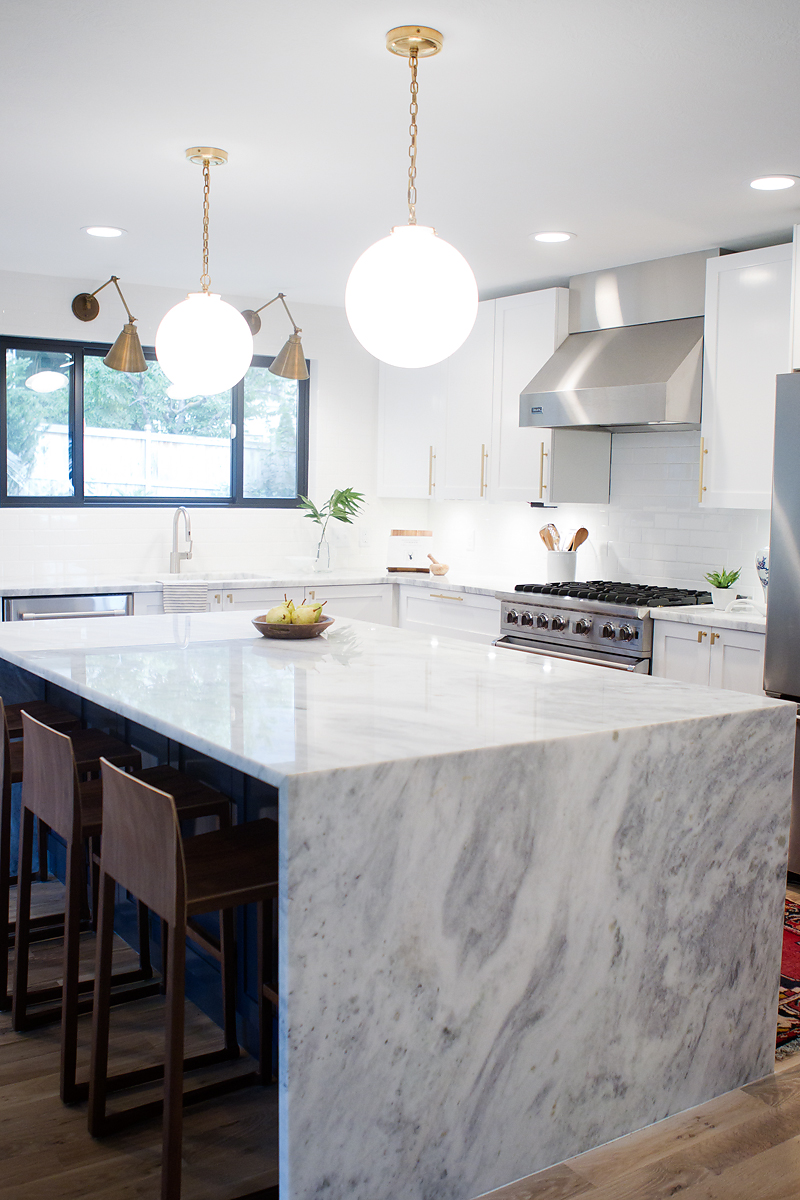
How do I choose the right countertop for my kitchen design?
Consider factors like durability, maintenance, and aesthetics when choosing a countertop. Think about how much cooking you do, how easy the material is to clean, and whether it complements your cabinetry and flooring. Visiting a showroom and consulting with a professional can also help you make the best choice for your needs.
Are there eco-friendly countertop options?
Yes, recycled countertops made from materials like glass, porcelain, or paper offer eco-friendly alternatives. These countertops are often made from sustainable or repurposed materials, reducing the environmental impact while still providing a durable and attractive surface.
Can countertops be repaired if damaged?
Minor damage like small chips or scratches can often be repaired by a professional, depending on the material. For example, quartz and solid surface countertops can usually be repaired, while more extensive damage to materials like marble or glass may require replacement of the affected area.
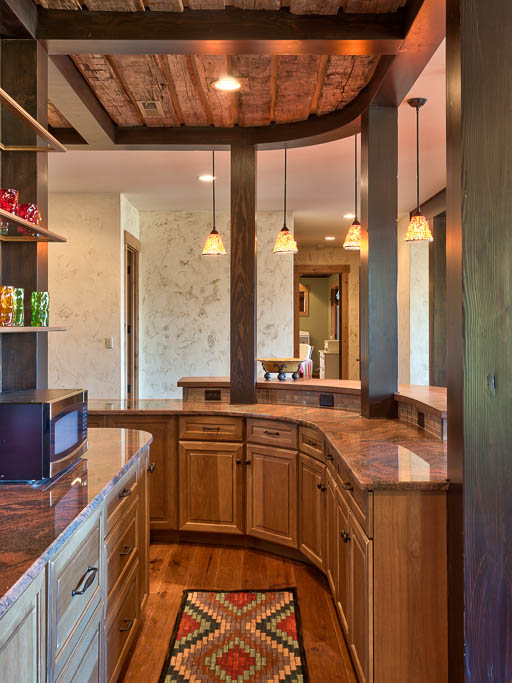
Related articles: